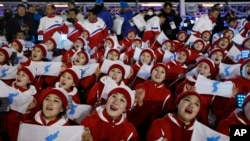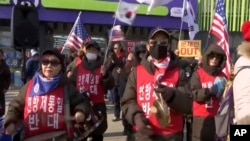The "Peace" Olympics has succeeded in creating diplomatic momentum toward resolving the nuclear standoff on the Korean Peninsula, but it is unclear whether it can be sustained.
At the closing ceremony of the PyeongChang Winter Olympics in South Korea on Sunday, Thomas Bach, the president of the International Olympic Committee, praised North and South Korea for using the games to advance reconciliation efforts.
"You have shared your faith in a peaceful future with all of us. You have shown how sports brings people together in our very fragile world," said Bach.
Diplomatic breakthroughs
North Korea's Olympic participation contributed to a prolonged pause in provocations on the Korean Peninsula. In the two years prior, North Korea fired over 25 missiles and conducted three nuclear tests, with the expressed goal of developing a nuclear-armed intercontinental ballistic missile that can target the U.S. mainland.
The U.S. also agreed to delay joint military drills with South Korea to ensure a peaceful environment during the games.
North Korean Olympians marched together with the South Korean team under a unification flag at the opening ceremony. The two Koreas fielded a unified women's hockey team as a squad of attractive North Korean cheerleaders chanted, "we are one" on the sidelines of Olympic events. Together with its national orchestra and taekwondo team that also performed in the South, the North's Olympic outreach tried to highlight inter-Korean friendship and cooperation.
By facilitating the North's participation, South Korean President Moon Jae-in's efforts produced several incremental diplomatic developments, including:
- The reestablishment of inter-Korean dialogue that was cut off in 2016 following a North Korean nuclear test.
- An invitation for a leaders summit in Pyongyang from North Korean leader Kim Jong Un to President Moon, delivered by Kim' sister Kim Yo Jong, who was head of her country's Olympic delegation for the opening ceremony.
- A new openness from Washington to unconditional exploratory talks with North Korea, voiced by U.S. Vice President Mike Pence at the end off his visit to South Korea, where he led the U.S. Olympic delegation at the opening ceremony.
And on the final day of the Olympics, the North Korean delegation told Moon that Pyongyang was also open to talks with Washington.
"We hope constructive talks will begin between North Korea and the United States at an appropriate opportunity," said Baik Tae-hyun, spokesman of South Korea's Ministry of Unification on Monday.
However it is unclear if Pyongyang and Washington are prepared to move beyond a passive openness for dialogue, to engage in serious direct diplomacy that would put on the table concessions from the North to seriously address denuclearization in exchange for support from the U.S. to begin to ease sanctions.
And tensions in the region are likely to increase again when the U.S. and South Korea announce plans to resume the joint military exercises in the next few weeks. North Korea has warned it would respond to the resumption of the joint drills, possibly by resuming provocative nuclear and missile tests, even if it means triggering further sanctions.
Sanctions relief
The North's Olympic "charm offensive" was seen by critics as an attempt to weaken international support for U.S. President Donald Trump's "maximum pressure" strategy to force the Kim Jong Un government to halt and eventually dismantle its threatening nuclear weapons program.
Washington has led efforts at the United Nations to impose increasingly severe economic sanctions on North Korea. Last week the Trump administration imposed additional unilateral sanctions on companies and vessels linked to the North Korean shipping trade to further restrict Pyongyang's ability to bypass sanctions, by obtaining oil and selling coal, using ship to ship transfers.
"The background of North Korea coming out for talks should be seen as coming from a sense of desperation, not from confidence," said Ahn Chan-il, a North Korean defector and analyst with the World Institute of North Korean studies.
South Korean skeptics
South Koreans were also divided over the North's inclusion in the Olympics.
Conservative groups, often waving American flags, protested the liberal President Moon's engagement polices, especially allowing Kim Yong Chul to head North Korea's Olympic delegation at the closing ceremony. Kim is a North Korean general believed to be responsible for ordering a deadly attack on a South Korean naval vessel in 2010, while he was head of the Reconnaissance General Bureau, a top North Korean military intelligence agency.
And many young South Koreans, who support Moon's progressive domestic agenda, lacked enthusiasm for the unification theme, and in particular objected to the joint hockey team that accommodated players from the North by reducing time on the ice for some players from the South.
"I think the South Korean government has not counted on the lukewarm reaction from the South Korean public," said Go Myong-Hyun, a North Korea analyst with the Asan Institute for Policy Studies in Seoul.
A Gallup Korea opinion poll, released in the final days of the games, showed a still divided public, with about 50 percent of respondents supporting the joint hockey team.
Lee Yoon-jee in Seoul contributed to this report.









